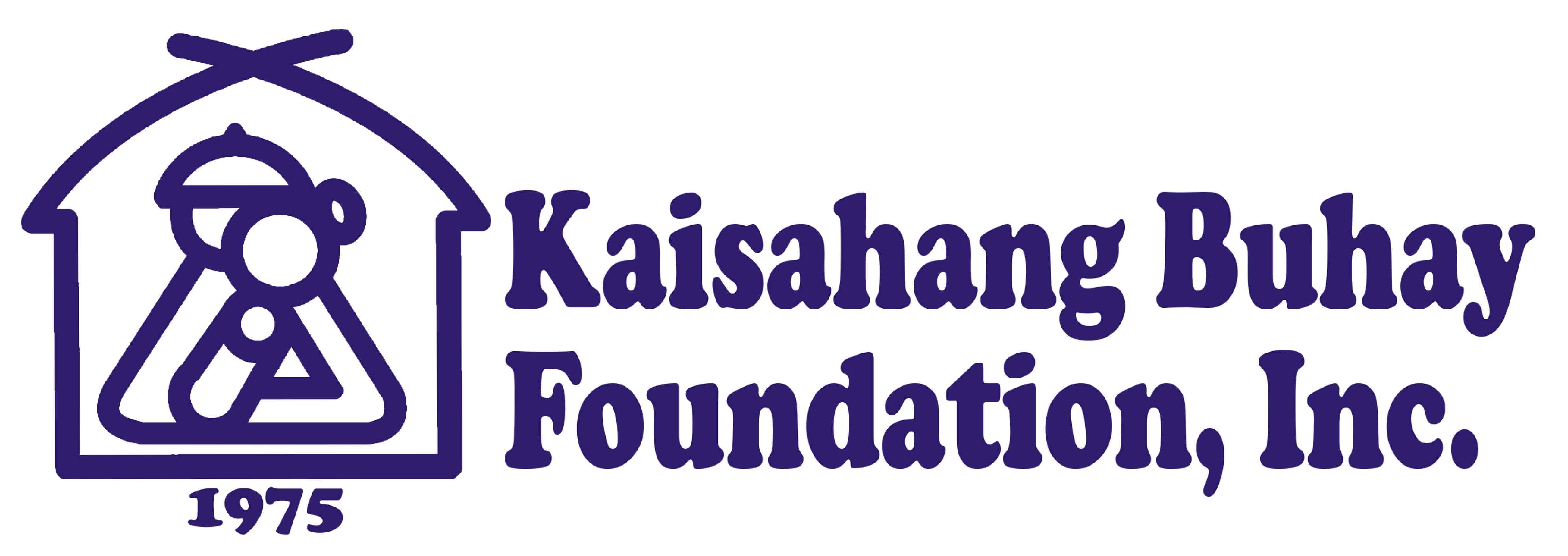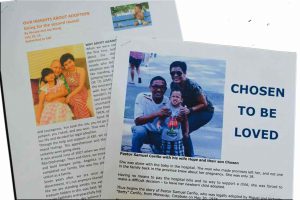
- Alternative Child Care Program
- ILEA Service
- Family & Community Outreach
- Sponsorship Program
- Child Nutrition Program
ALTERNATIVE CHILD CARE PROGRAM
KBF’s Alternative Child Care Program (ACCP) is a testament to the pursuance of its mission of providing a safe and loving permanent home to Filipino children. The program includes the Domestic Adoption Service, Foster Care Service and Independent Living and Educational Assistance Service for youth who have aged out from other Residential Facilities.
Utilizing the Republic Act No. 11642 of 2022 or the Domestic Administrative Adoption and Alternative Child Care Act as a guide the KBF-ACCP aims to:
- Provide quality alternative child care services that will ensure that protection of a child without parental care.
- To ensure permanent placement of a child legally available for adoption thru domestic adoption service
- Promote Foster Care as an alternative to Residential Care.
- Provide assistance to abandoned and homeless youth towards independent living and responsible adulthood.
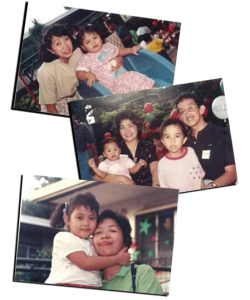
DOMESTIC ADOPTION SERVICE
KBF’s Domestic Adoption Service was initially dominated by placements with foreign families residing in the Philippines. From 1978 to 1988, KBF placed a total of 186 children, 43 or 23% were placements with Filipino families and 143 or 77% were placements with foreigners, mostly American families in Clark Field and Subic military bases.
With the effectivity of the New Family Code in 1988, banning foreigners from adopting Filipino children in Philippine courts, KBF all the more strengthened its recruitment campaign to develop more Filipino adoptive homes. Since then, KBF has positive adoption results as indicated by a total placement of 86 children to Filipino families over a five-year period (1989 to 1993). While the increment in adoption statistics is quite modest, it is a significant accomplishment considering the cultural barriers that have to be overcome regarding adoption. Moreover, the five year accomplishment (1989 to 1993) of 86 placements is a breakthrough, compared to our 43 placements with Filipino families over a ten-year period (1978 – 1988).
The recent passing of the Republic Act 11642 or also known as the Domestic Administrative Adoption and Alternative Child Care Act of 2022 shifted adoption from a socio-legal into a purely administrative process.
It also created the National Authority for Child Care, an agency which shall focus on Alternative Child Care Services in the country.
ADOPTION LAW IN THE PHILIPPINES
RA 11642 – THE DOMESTIC ADOPTION ACT OF 2022
Strengthening alternative child care by providing for an administrative process of domestic adoption, reorganizing for the purpose, the Intercountry Adoption Board (ICAB) into the National Authority for Child Care (NACC), amending for the purpose Republic Act No. 11222, and Republic Act No. 8552 and Republic Act No. 9523.
QUALIFICATIONS
- A Filipino citizen or an alien with at least 5 years of habitual residency
- At least 21 years old with al least 21 years age gap to the adoptee
- Mentally and physically fit to adopt a child
- With stable financial capacity to provide for the child
- With no pending cases in any court especially of moral turpitude
REQUIREMENTS:
- Marriage Certificate in SECPA form or Decree for Annulment of Marriage, if annulled.
- Birth Certificates of Applicant Families and their children in SECPA Form.
- Death Certificate of either applicant, in SECPA Form, as applicable.
- Written consent to adoption of the applicant’s biological/adopted and illegitimate children 10 years and above, if living with the prospective adoptive parents.
- Psychological Evaluation Report.
- Medical Certificate.
- Latest Income Tax Return (ITR) and Certificate of Employment; other financial proofs e.g. certificate of savings, land titles, etc.
- Three (3) Reference Letters of Character References.
- NBI/Police Clearance of Applicants/Court Clearance.
- Three (3) Statement of Acceptance (Affidavit of Temporary Custody)
- Certificate of Attendance to Pre-Adoption Forum.
- Recent close up and whole body pictures of the PAPs taken within the last six (6) months. House photo documentations.
- Child Care Plan
PROCESS
1. iNQUIRY
The parent/s will call or sent a message to inquire for the domestic adoption process, then be invited to a Pre-Adoption Forum.
2. APPLICATION
Applicants will be given an Adoption Kit, submit initial documents for the approval of the Program Supervisor, then be scheduled for a home visit
3. HOME STUDY REPORT PREPARATION
Home visitations, interviews and collection of the documents will be done, approved HSR will be submitted to the DSWD Field Office for the family to be included to the roster of adoptive families.
4. FAMILY SELECTION/MATCHING
The family will be presented during a matching conference. The CWSC will find a matched child based on the family’s preferences.
5. PLACEMENT PREPARATION
A letter of Acceptance will be submitted by the family after the result of the matching conference. The family can visit their matched child.
6. PLACEMENT
The custody of the matched child will be given through the PAPA signing. The social worker in charge will conduct a monthly Post Placement Supervisory Report to ensure that the family adjusts well.
7. FINALIZATION
Family will file the petition for adoption before the RACCO with the complete documentary requirements. After the assessment and validation of documents, RACCO will issue the finality and order the LCRO to issue an emended birth certificate of the child.
FOSTER CARE SERVICE
RATIONALE
The biological family is responsible for providing life to the child and should for that reason be nurtured and preserved whatever possible. There are instances, however, when this not be possible. Problems of broken home, unwed motherhood, abandonment, illness and extreme poverty seriously prevent some families to fulfill its primary function in rearing the child, thus substitute parental care becomes necessary. The child has to be cared for by others temporarily until such time the biological family is ready to provide parental care or until a permanent placement is provided such as adoption.
LEGAL BASE
- UN General Assembly Declaration on Social and Legal Principles Relating to the Welfare of Children with Special Reference to Foster Placement and Adoption, Nationally and Internationally
- Convention on the Rights of the Child, Article 20
- RA 10165, Foster Care Act of 2012
- RA 11642, Domestic Administrative Adoption and Alternative Child Care Act
- PD 603, Article 6B (Institutional Care)
WHAT IS FOSTER CARE SERVICE
KBF defines Foster Care Service as a temporary substitute family care for children — newborn to five years old – when their birth families cannot take care of them temporarily or permanently. Licensed foster families provide the family environment needed for the growth and development of the children in their care while awaiting return to their birth families or adoption.
WHAT ARE THE ADVANTAGES OF FOSTER CARE
- The foster child as a complete family. He is assured of an individualized are and appropriate developmental activities.
- The cost of foster care compared to residential care or institutional care is significantly cheaper.
WHO ARE THE CHILDREN IN NEED OF FOSTER CARE?
- Children 0 to 5 years of age, healthy or with special need who are in need of temporary care.
- Other children who were not reunited with birth families, nor adopted.
WHAT IS A FOSTER FAMILY
- The foster family could either be childless or with children wiling provide love and care to a non-related child or children. The foster family should be able to handle anxiety and separation since foster children are only temporary care.
- The foster family is either subsidized foster family or volunteer foster family. A volunteer foster family pays for all the needs of the foster child and not given subsidy for taking care of the child.
- A foster family is licensed by the Department of Social Welfare and Development
PROCESS OF BECOMING A LICENSED FOSTER PARENT
1. INQUIRY THROUGH THE FOLLOWING:
A. Phone Calls
B. Office Visit
C. Attendance in Foster Care Forum
2. SUBMISSION OF FILLED-OUT APPLICATION FORM
3. HOME VISIT, INTERVIEW AND COLLATERAL INTERVIEW TO ESTABLISH ELIGIBILITY OF FOSTER FAMILY APPLICANT THROUGH INTERVIEW.
4. SUBMISSION OF REQUIRED DOCUMENTS
A. Birth Certificate of the Couple
B. Marriage Contract
C. Police Clearance or Barangay Clearance
D. Health Certificate of the Couple
E. Three (3) letter of reference from any of the following: Friends, Neighbors, co-employee, employer, Parish Priest or whoever that could help establish the capability and integrity of the applicants.
F. Letter of Consent of Children 10 years old or age and above of foster applicants.
G. Recent post-card sized family picture.
5. SUBMISSION OF RECOMMENDATION TO THE DEPARTMENT OF SOCIAL WELFARE AND DEVELOPMENT (DSWD) FOR LICENSING OF FOSTER FAMILY APPLICANT.
6. ISSUANCE OF FOSTER FAMILY CARE LICENSE BY THE DSWD.
INDEPENDENT LIVING & EDUCATIONAL ASSISTANCE SERVICE
SERVICE RATIONALE
Thousands of homeless children who were abandoned, neglected orphaned and surrendered are staying in Government institutions, in private child-caring agencies, or in licensed foster homes. But not all of them are fortunate enough to be reunited with their birth families. They have to be prepared to support themselves when they are no longer qualified to stay in the institution or foster families.
It is in this context that Kaisahang Buhay Foundation has recognized the need for Independent Living and Educational Assistance Service with education as its main component to help these children become independent, self-reliant, productive and God-fearing citizens.
PHILOSOPHICAL BASE
KBF believes that in the absence of a permanent family to love, care, guide and prepare a child for adult life, a child should be empowered to take care of oneself. The child if given the chance can become independent, self-reliant, God-fearing and an asset to nation-building.
LEGAL BASE
ARTICLE 26 OF UNIVERSAL DECLARATION OF HUMAN RIGHTS (1948)
Every person has the right to education
Education shall be directed to the full development of respect for human rights and fundamental freedom.
CRC STATES THAT:
ARTICLE 28 – the right of every child to education and with a view to achieving this right progressively and on the basis of equal opportunity
PD 603, ARTICLE 3
Every child has the right to an education commensurate to his abilities and to the development of his skills and for the improvement of his capacity for service to himself and to his fellowmen.
BENEFICIARIES
Children who are not adoptive, who are no longer eligible by age in institutions and who have no family to turn to.
PROGRAM OBJECTIVES
- To provide secondary, vocational and in special cases, college education
- To provide group home as venue to learn life skills and experience family like environment
- To inculcate love of God, family, country and environment
- To strengthen capability, trust and to relate with others
- To enable individual scholars “heal”, regain self-worth and be prepared for an independent life
- To enable the scholars to get employment afer graduation
FAMILY AND COMMUNITY OUTREACH PROGRAM
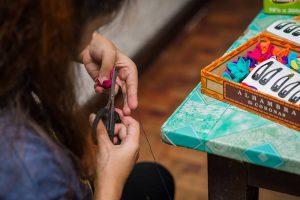
RATIONALE
Kaisahang Buhay Foundation, Inc (KBF) commits to fulfilling and promoting the child’s rights to quality education. KBF and HOLT international believe that families if organized and empowered, can be instruments for community development and nation-building and, more so, for the children to enjoy their rights.
KBF’s Family and Community Outreach Program (FCOP) uses social preparation, social mobilization, and volunteer resource development to organize the communities it serves.
PHILOSOPHY
- We believe that people can change and start where they are.
- We believe cooperation and organized collective effort/action, not individualistic competition for nation building.
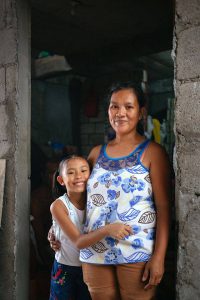
LEGAL BASIS
A. 1986 Philippine Constitution, “Roles and Rights of People’s Organizations” mandates that the government shall respect, support and promote the rights of People’s Organizations.
B. Executive Order 548, “Minimum Basic Needs Approach in the Social Reform Agenda” encourages families to initiate and participate in community organizations to meet their primary requirements for survival.
C. UNCRC – In 1989, the United Nations on the Rights of the Child (UNCRC) was approved by the United Nations (UN). In 1990, the Philippine Government 3rd AIPA CAUCUS REPORT 2 became the 31st state to ratify the Convention by virtue of Senate Resolution 109. After ratifying the UNCRC, the country through the Council of the Welfare of Children (CWC), formulated a children’s welfare policy framework embodied in the National Plan for Children, which until now it the basis of the continuing efforts undertaken by the Government to achieve the realization of the nation’s vision for the child protection and development.
C. UNCRC – In 1989, the United Nations Convention on the Rights of the Child (UNCRC) was approved by the United Nations (UN). In 1990, the Philippine Government 3rd AIPA CAUCUS REPORT 2 became the 31st state to ratify the Convention by virtue of Senate Resolution 109. After ratifying the UNCRC, the country, through the Council for the Welfare of Children (CWC), formulated a children’s welfare policy framework embodied in the National Plan for Children, which until now is the basis of the continuing efforts undertaken by the Government to achieve the realization of the nation’s vision for the child protection and development.
OBJECTIVES
A. It aims to empower disadvantaged families to care for & nurture their children.
B. Improve the quality of life of disadvantaged families and communities through organizing, problem-solving, and decision-making.
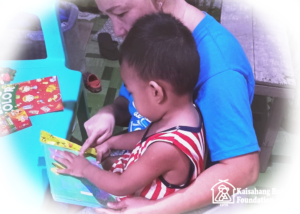
PROGRAMS AND SERVICES
A. EDUCATIONAL ASSISTANCE SERVICE (EAS)
KBF established Educational Assistance Service (EAS) in May 2017. It provides supplementary material and financial support to children in selected elementary and high schools with a high rate of children at risk of dropping out and children who have dropped out to return to school and continue their studies.
EAS Includes the following activities:
- Provision of a Set of School Supplies
- Provision of School Bag
- Provision of Black Shoes and Rubber Shoes
- Provision of School Uniform/White Shirts
- Provision of a Hygiene Kit
- Children’s Capacity Building Training
- Support to Partners
B. SUPPLEMENTAL FEEDING SERVICE (SFS)
Supplementary Feeding Service (SFS) aims to provide extra food beyond the regular meal ration at home to children six months to 5 years in low-income communities who are vulnerable to malnutrition, to prevent undernutrition, and/or to rehabilitate children who are identified to be undernourished to a higher or normal nutritional status.
SFS Includes the following activities:
- Feeding Program
- Deworming
- Capacity Building for Parent Leaders and Parents
C. EARLY CHILDHOOD CARE AND DEVELOPMENT SERVICE (ECCD)
The HB-ECCD project is in keeping with KBF’s Family Strengthening focus with its intention to capacitate the parents to improve their caregiving practices to support the holistic development of children and reduce the likelihood of child abuse and neglect.
HB-ECCD Includes the following activities:
- Provision of Home-based and Early Childhood Care and Development (HB-ECCD) Nutritious Snacks to Children
- Provision of Home-based and Early Childhood Care and Development (HB-ECCD) Early Learning Materials
- Training of Parent Leaders and Parents
E. PARENT EDUCATION SERVICE (PES)
Parent Education Service (PES) is the provision and expansion of knowledge and skills of parents and parent substitutes/caregivers on parenting to respond to parental duties and responsibilities in early childhood development, behavior management of younger and older children, and husband-wife.
PES Includes the following activities:
- Empowerment Sessions
- Capacity Building
- Parent Volunteers Formation
F. COMMUNITY OUTREACH SERVICE
Community Outreach Service (COS) aims to provide additional support to individuals’ access to their basic needs. In addition, we want to build avenues for caring individuals, groups, and organizations who want to support and contribute to those unable to sustain their basic needs. We also aim to recognize the contribution of caring individuals, groups, and organizations in COS activities.
SPONSORSHIP “ORPHAN CARE” PROGRAM
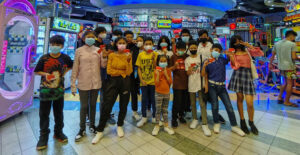
RATIONALE
Holt International – Sponsorship “Orphan Care” Program was started in the Philippines in July 1984; a preliminary proposal on the Sponsorship Program between the Reception and Study Center for Children – RSCC NCR and Holt International Children’s Services was agreed upon and immediately implemented in August 1984. There were forty-seven (47) babies sponsored until December 1984.
The assurance from Holt to continue the Sponsorship Program thru 1985 brought about a more significant relationship and appreciation between the two agencies. This financial assistance proved to be a timely response to the increasing needs of the growing admission at RSCC Quezon City.
LEGAL BASE
Republic Act 6972 mandates the Republic Act No. 10173 or the “Data Privacy Act of 2012” and applicable National Privacy Commission Issuance. Any violation of this clause and any of the provisions of the said law and issuance by the persons above shall be subject to the corresponding sanctions, penalties, and fines under the said law without prejudice to any other applicable criminal and civil liability.
DESCRIPTION OF THE PROGRAM
Holt International – Sponsorship Program enables sponsors, the child care centers, foster care children, FamiFamilies children in the community, and staff in-country to share in providing vital services to needy children. Good photographs and comprehensive, timely child reports are Sponsorship’s primary toll to funding overseas programs serving children successfully.
Child Sponsorship allows an individual to provide funds to assist a child’s well-being until the child becomes self-sufficient.
This is a way for Holt to raise funds to support the children and families in Holt’s programs.
The goal for each child in Sponsorship are Family Preservation, Family Reunification, Adoption, or Long Term Care.
WHO ARE ELIGIBLE FOR HOLT INTERNATIONAL SPONSORSHIP “ORPHAN CARE” PROGRAM
A Child Caring Agencies provides twenty-four hours residential group care service for children 0-12 years old who are abandoned, orphaned, neglected or surrendered; and can be helped through socialization; those who are underweight or malnourished but are free from communicable disease.
Sponsored Child Care Center needs the financial support of Holt International to augment its resources to meet the needs of the children in care.
Child Sponsorship allows an individual to provide funds to assist a child’s well-being until the child becomes self-sufficient.
This is a way for Holt to raise funds to support the children and families in Holt’s programs.
The goal for each child in Sponsorship are Family Preservation, Family Reunification, Adoption, or Long Term Care.
RESPONSIBILITIES OF THE CHILD CARING AGENCIES
Holt Sponsored Child Caring Agency will prepare and submit the following Reports with JPEG Photos on time.
Intake Report with JPEG photos of the children
a) Intake Reports with JPEG photos are to be accomplished and submitted for the initial children;
b) A new Intake Report/s with JPEG photo/s will be required and submitted for replacement case every time a sponsored child is discharged;
Progress Report/s with JPEG photos of the children submitted on a trimester cycle (three times a year), i.e. every four (4) months of the current year; and
Departure Report/s to be submitted when a sponsored child/ren is/are discharged under the Sponsorship Program. The Departure Report or Discharge Report should be submitted within the quarter after the child’s discharge from the Sponsorship Program. The new replacement will require a new intake report and JPEG photo.
Prepare and submit the following Annual Holt Child Correspondence – Artwork, Letter, and JPEG Photo children for submission to Holt International through the KBF.

CHILD NUTRITION PROGRAM
STANDARDIZING CHILD NUTRITION SCREENING AND FEEDING PRACTICES TO IMPROVE HEALTH AND WELLBEING OF VULNERABLE CHILDREN AROUND THE PHILIPPINES
OUR OBJECTIVES:
CNP supports orphanages to improve health monitoring, filling in the gaps to create a more complete picture of health for every child in care everywhere we work
TRAINING OF TRAINERS
Through this model of intensive training of trainers who will train others, we maximize our outreach exponentially. The training comes with tools to support caregivers as they learn concept and implement the skills and practices in the centers
NUTRITION SCREENING SYSTEM
Tracking and monitoring a child’s growth is the best way to identify risk of malnutrition. Through the Nutrition Screening System (NSS), caregivers learn how to track critical indicators for every child in care. The NSS is accompanied by a database that empowers caregivers to not only provide better individual child care, but also track trends across the institution to inform best practices.
FEEDING AND POSITIONING TRAINING
This training is designed for children who cannot feed themselves, primarily for infants and children with disabilities. We have found that small interventions like holding a baby during feeding, sitting children upright or changing the texture of their food can have dramatic life-changing effects for the child.
OUR TRAINED PARTNERS
- DSWD FO CAR: Reception and Study Center for Children, Regional Rehabilitation Center for Youth, Haven
- Region CAR: Helping Hands Healing Hearts Ministries, Inc.
- DSWD FO III: Reception and Study Center for Children
- Region III: Hospicio de San Jose Transitory Home
- NCR: Hospicio de San Jose, Concordia Children’s Services
- DSWD FO V: Reception and Study Center for Children, Haven for Women and Girls, Foster Care
- DSWD FO XI: Reception and Study Center for Children, Angel’s Haven, Home for Girls
- Region XI: Children’s Joy Foundation
ABOUT KBF
Kaisahang Buhay Foundation Incorporated is a private, non-profit child and family welfare organization duly licensed and accredited by the Department of Social Welfare and Development (DSWD). It is registered with the Securities and Exchange Commission, and certified as a donee institution by the Bureau of Internal Revenue and the Philippine Council for NGO Certification. The organization’s name, Kaisahang Buhay Foundation, stands for oneness within the family and meaningful life for the children it serves.
HOW TO REACH US
Address: #56 10th Avenue, Cubao, Quezon City, Philippines 1109
Phone: (+63) 912-1159
Email: kbf@kbf.ph
Website: www.kbf.ph
Facebook Page: facebook.com/kaisahangbuhayfoundation
